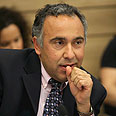
'Understanding with yeshivot will prevent rift'
Prime Minister's Office Director-General Eyal Gabai calls for Har Bracha Yeshiva to be isolated from rest of institutions out of concern that otherwise may lead to 'mass insubordination among religious sector' in case of clashes with settlers. Yeshiva official: Netanyahu should get involved
"The instance of Har Bracha Yeshiva must be isolated from the rest of the hesder yeshivot. Reaching an understanding with the hesder yeshivot is meant to prevent the threat presented by the phenomenon of spreading insubordination in the case of clashes with settlers in Judea and Samaria," Prime Minister's Office Director-General Eyal Gabai said over the weekend in closed talks.
Gabai is serving as the mediator in the rift between Defense Minister Ehud Barak and the hesder yeshivot.
A yeshiva official told Ynet on Saturday night that he hopes Gabai's statements indicate the prime minister's willingness to become significantly involved in the affair.
Following the decision made by Defense Minsiter Ehud Barak and Chief of Staff Gabi Ashkenazi to remove the Har Bracha Yeshiva, which is under the tutelage of Rabbi Eliezer Melamed, from the hesder arrangement with the IDF, concerns grew that hesder soldiers would become insubordinate in any mission regarding settlers.
Recent misgivings were that statements allegedly made by Rabbi Haim Drukman, who heads the Hesder Yeshiva Association, in a pamphlet distributed at synagogues regarding his understanding of instances in which hesder soldiers would notify their commanders that they would not be able to deal with problems with settlers, caused an additional radicalization of positions.
An attempt to clarify the statements with Rabbi Drukman, who is opposed to insubordination in the IDF, only increased concerns within the political echelons that the rift had grown bigger.
Dozens of yeshivot and thousands of students are included in the hesder arrangement. The course is constructed of four years, 18 months of which are spent in routine IDF service and an additional two and a half years in service without pay. The arrangement's aim is to allow members of religious Zionism to take part in meaningful combat service without compromising their Torah studies.
It turns out that during the meeting held on Wednesday between Gabai, Rabbi Drukman, and Hesder Yeshiva Association spokesman Rabbi David Stav, the rift was not bridged. Yeshiva leaders are still demanding that the Har Bracha Yeshiva and Rabbi Eliezer Melamed be brought back into the folds of the arrangement with the Defense Ministry.
Statements made by Drukman that were published that same day only deepened the schism. In actuality, despite declarations made by the senior-most spiritual leader of the hesder yeshivot claiming that he is opposed to insubordination, senior officials in the political establishment estimated that a rift still remains.
Decisive action needed
Senior officials in Jerusalem expressed their concern that the growing gap between Defense Minister Ehud Barak and the hesder yeshivot would prompt thousands of yeshiva soldiers serving in the IDF in reserve and mandatory service to refuse orders should clashes break out between soldiers and settlers if their rabbis call upon them to do so.In their opinion, the defense establishment and the political leadership must take decisive and determined action now to prevent such a destructive situation from developing. According to them, the rift must be healed through quiet, low-profile talks with the rabbis.
"I believe the decision regarding removing Har Bracha from the arrangement was stately, correct, and appropriate," said Gabai in a closed forum. "However, I believe that this incident must be isolated, and the bounds of the controversy not be allowed to spread to the rest of the hesder yeshivot."
"The issue of Har Bracha must be taken off the agenda, we must move on. Though the issue of Har Bracha is difficult for Rabbi Drukman, we need to continue speaking with him," said Gabai. "It is the responsibility of the prime minister and the defense minister to find a way to bridge the gap. I will continue meeting with the rabbis soon. We must continue speaking with the rabbis in order to prevent a rift. The devastating significance of such a rift is clear to all of us."
A source in the hesder yeshivot said to Ynet that he hopes Gabai's statements indicate the prime minister's willingness to become significantly involved in the affair, as the rabbis called for from its inception in a bid to bring Har Bracha back into the arrangement and put an end to the crisis.
The Hesder Yeshiva Association's media advisor, Avi Lerner, reported in response, "The association leadership is continuing its efforts to promote a solution of dialogue and understanding in order to put an end to the crisis and reinstate the previous conditions."
Kobi Nahshoni contributed to this report










